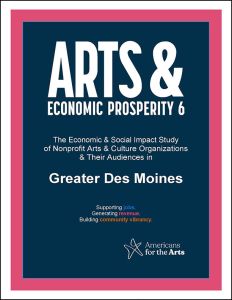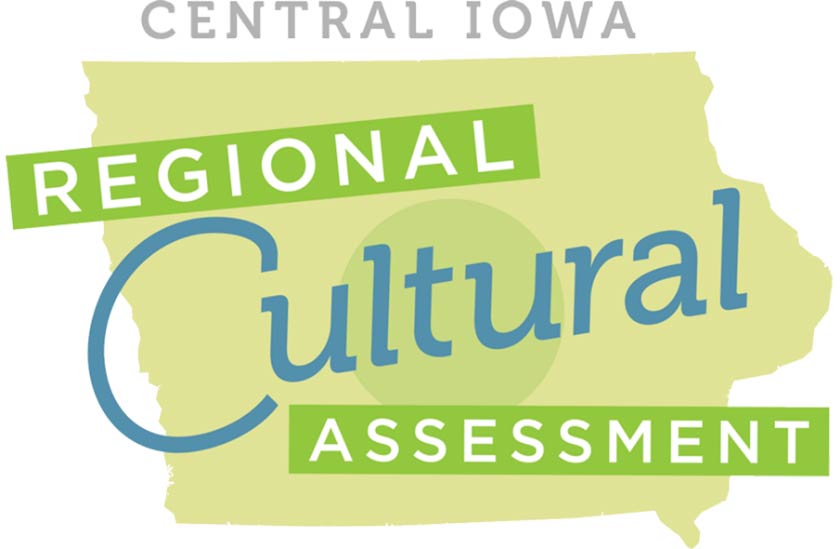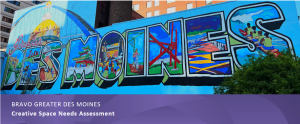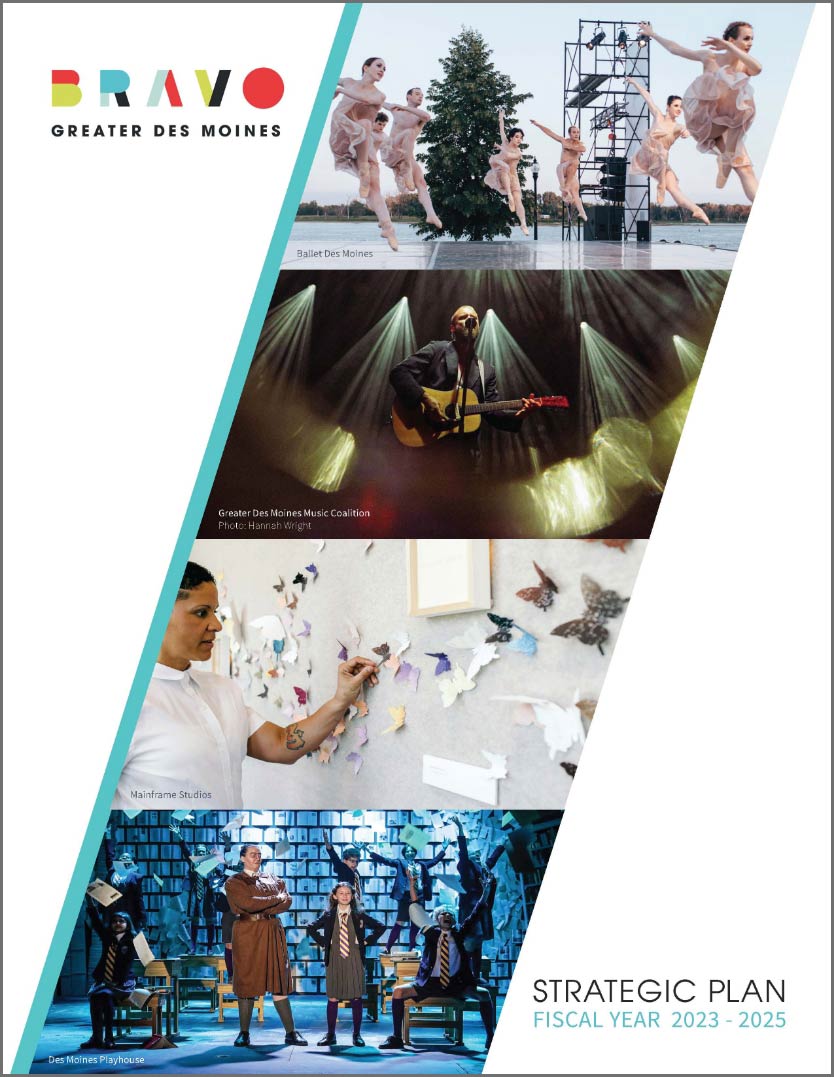Resources
ARTS & ECONOMIC PROSPERITY STUDY (AEP6)

AEP6 is the sixth iteration of the economic impact study by Americans for the Arts was released in Fall 2023. This study is conducted approximately every 5 years to gauge the economic impact by nonprofit arts and cultural organizations and their audiences.
Explore our region’s results:
REGIONAL CULTURAL ASSESSMENT

In 2016, Bravo commissioned a Regional Cultural Assessment to further strengthen the role of arts and culture as vibrant contributors for powering growth, progress, and change. From the research, community input, and stakeholder conversations, four cultural priorities emerged as the most strategic opportunities to advance regional catalyst priorities.
CREATIVE SPACE NEEDS ASSESSMENT

In response to concerns raised within the arts and culture sector about a lack of facilities and amenities in the Greater Des Moines area, Bravo partnered with Keen Independent Research to identify the needs of the region’s arts, culture and heritage organizations, as well as the space/collaboration needs of Bravo’s partner cities.
Explore the findings:
Resources
SurveyMonkey Apply FAQ
How to begin using SurveyMonkey Apply and commonly asked questions.
About the SMU DataArts Cultural Data Profile
How to get started with SMU DataArts and completing your Cultural Data Profile.
Eligible & Ineligible Expenses for GC24 Operating Grants
Learn what types of expenses Operating Grants can be used to support.
Tips for Writing a Successful Application
A grant application is a story. Use this guide to help your organization submit a strong application.
There are many funding opportunities available in central Iowa and beyond. While we do not know the eligibility and application criteria unique to each program, we’re happy to share these opportunities from our partners. Please reach out directly to these organizations with questions.
Iowa Arts Council/Iowa Economic Development Authority
The Iowa Arts Council offers a variety of competitive grants to support arts and culture focused nonprofits in the state of Iowa.
Polk County Community Grants
Polk County offers grants and sponsorships for Polk County nonprofits several times a year.
United Way of Central Iowa
The United Way of Central Iowa invests in regional nonprofits that align with their United to Thrive funding priorities.
Prairie Meadows Grants
Prairie Meadows supports regional nonprofits with annual grants. Applications are due in late February.
Variety — the Children’s Charity
Supports youth focused nonprofits in Iowa.
Community Foundation of Greater Des Moines
The Community Foundation offers a variety of grants to support leadership, capacity building, and strategic collaboration.
Please reach out directly to organizations with questions regarding their training opportunities.
Greater Des Moines Partnership
Offers trainings, events, and resources for small businesses.
The University of Iowa’s Larned A. Waterman Iowa Nonprofit Resource Center
Provides services to strengthen the operational capacity of Iowa nonprofit organizations.
Nonprofit Finance Fund
Offers articles and webinars on financial fundamentals for nonprofits.
Americans for the Arts
Offers trainings, articles and webinars to help arts organizations thrive and provides tools to connect the arts’ social impact with other sectors.
Community Foundation of Greater Des Moines
Offers a variety of resources to help nonprofits thrive: Colleague Connect, Trainings, helpful links, consultant recommendations, etc.
Iowa Nonprofit Alliance
Offers trainings and advocates for Iowa nonprofits.
Arts Impact Explorer
From Americans for the Arts, the Arts Impact Explorer highlights the vast impact that the arts has on over 25 topics.
Bravo Awards Gala Honorees Announced for 2024 Event
Release: Monday, December 11, 2023
Bravo Greater Des Moines Awards Record $4.5 Million in General Operating Support Grants
Release: Monday, December 4, 2023
Logo Kit
For use by grant recipients and community partners
Grant recipients are strongly encouraged to recognize Bravo and the 17 investor communities wherever possible. If you have any questions on when or how to use the logo, please contact us.
Bravo by the Numbers
Grants awarded since 2004 dollars invested in arts, culture and heritage organizations and programs
Grant dollars invested arts, culture and heritage organizations and programs since 2006
Bravo cultural partners in 2023
Estimated participants (audiences, visitors, patrons) in arts, culture, and heritage events in 2023 in Greater Des Moines
Number of volunteers that support the non-profit cultural sector in Greater Des Moines
Public funding via hotel-motel tax invested in Bravo in 2023
Subscribe to the Bravo Monthly Newsletter
A round-up of arts & culture happenings and events across the Greater Des Moines region in your inbox each month.

